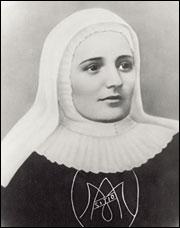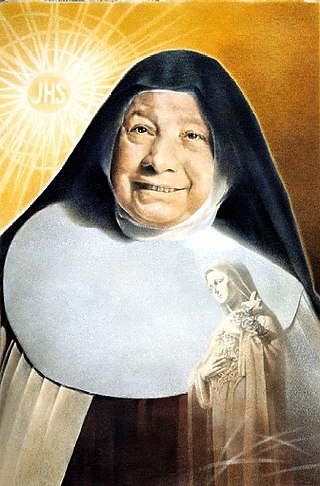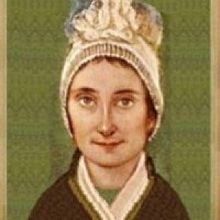
Karolina Gerhardinger was a German Roman Catholic religious sister who founded the School Sisters of Notre Dame. Gerhardinger served as an educator in Bavaria until the establishment of her order, which provided free education to the poor and soon expanded in Europe.

Magdalena di Canossa was an Italian religious sister and the foundress of the two Canossian congregations. Magdalena was a leading advocate for the poor in her region after she witnessed first hand the plight of the poor following the spillover effects of the French Revolution into the Italian peninsula through the Napoleonic invasion of the northern territories. Canossa collaborated with humanitarians such as Leopoldina Naudet and Antonio Rosmini in her mission of promoting the needs of the poor and setting a new method of religious life for both men and women.

Giulia Salzano was an Italian Roman Catholic professed religious and the founder of the Catechetical Sisters of the Sacred Heart of Jesus (1905). Salzano served as a teacher prior to becoming a religious and since 1865 worked in Casoria as a teacher for children where she demonstrated herself as an apt catechist and instructor.
Giuseppina Gabriela Bonino, also known by her religious name Giuseppina Gabriella of Jesus, was an Italian Roman Catholic professed religious and the founder of the Suore della Sacra Famiglia di Savigliano. Bonino dedicated her life to the ill and to orphans and did this in drawing upon her own experience in tending to her ailing father and to orphans in her hometown - all this prior to and after the establishment of her religious congregation.

Maria Domenica Mantovani was an Italian Roman Catholic professed religious, and the co-founder of the Little Sisters of the Holy Family; she established them alongside Giuseppe Nascimbeni. As a nun she received the religious name of Maria of the Immaculate.

Blessed Maria Pia Mastena - born Teresa Maria - was an Italian religious sister in the Roman Catholic Church. She was the founder of the Religious Sisters of the Holy Face. Mastena fostered a deep devotion to the Holy Face of Jesus and tried to promote that devotion to others in her religious career as a nun. Mastena first desired the contemplative life but was denied this after she entered the convent since it was not a cloister. Instead she dedicated herself to teaching in several Italian cities after having left another convent and another religious order when she deemed contemplative life was not the life she felt God wanted for her. Her labors were dedicated instead to consolidating a new religious congregation which began to grow after World War II until Mastena's sudden death in 1951. Mastena was beatified on 13 November 2005.

Laura Montoya, in full María Laura de Jesús Montoya Upegui, religious name Laura of Saint Catherine of Siena, was a Colombian Roman Catholic religious sister and the founder of the Congregation of the Missionary Sisters of the Immaculate Virgin Mary and Saint Catherine of Siena (1914). She was well known for her work with Indigenous peoples and for acting as a strong role model for South American girls.

Blessed Maria Teresa of Saint Joseph, DCJ, was a German religious sister and the founder of the Carmelite Daughters of the Divine Heart of Jesus. Tauscher worked in Cologne and was removed from her position after she converted to Roman Catholicism in 1888 so founded a congregation in the Netherlands upon choosing the Carmelite charism for her life.

Maria Josefa Alhama y Valera, religious name Maria Esperanza of Jesus, was a Spanish religious sister. She was the founder of both the Handmaids of Merciful Love in 1930 and the Sons of Merciful Love in 1951. ´

Maria Giuseppa Scandola, MSV, was an Italian member of the Missionary Sisters of Verona, also known as the Comboni Missionary Sisters. She served in what is now South Sudan, where she offered up her life in 1903.

Rosa Elena Cornejo Pazmiño, also known by her religious name María Francisca of the Wounds, was an Ecuadorian religious sister in the Roman Catholic Church. She founded the Hermanas Franciscanas Misioneras de la Inmaculada.

María Josefa Sancho de Guerra was a Spanish Roman Catholic nun who established her own congregation known as the Servants of Jesus of Charity. She wanted her new congregation to focus on the care of the sick and the poor. She assumed the religious name of "María Josefa of the Heart of Jesus".

Klara Szczęsna, S.S.C.J. was a Polish Catholic religious sister. She was the co-founder of the Sisters, Servants of the Most Sacred Heart of Jesus which she established with Józef Sebastian Pelczar.

Maria Crocifissa Curcio, CMST was an Italian Catholic religious sister who established the congregation of the Carmelite Missionary Sisters of Saint Therese of the Child Jesus.

Carolina Santocanale was an Italian Roman Catholic nun who assumed the name of "Maria of Jesus" and established the Capuchin Sisters of the Immaculata of Lourdes. Santocanale became well known for her treatment of the ill and the poor to whom she devoted her life and work to and was also a member of the Secular Franciscan Order.

Maria Scrilli, religious name Maria Teresa of Jesus, was an Italian religious sister who established the Sisters of Our Lady of Mount Carmel.

Rafaela Porras Ayllón, religious name Mary of the Sacred Heart of Jesus, was a Spanish religious sister who established the Handmaids of the Sacred Heart of Jesus in conjunction with her sister Dolores. She devoted herself to the management of the congregation and resided in Rome until her death after her resignation as the congregation's superior in 1893.

Bernarda Heimgartner was a Swiss religious sister and the co-founder of the Sisters of the Holy Cross Menzingen. Heimgartner founded this order alongside Theodosius Florentini OFMCap in 1844 and served as its mother superior until three months before her death. She had become a member of the Sisters of Divine Providence in 1843 and made her vows in 1844 before establishing a new congregation.

Helena Stollenwerk, SSpS was a German Catholic religious sister who collaborated with Arnold Janssen and Hendrina Stenmanns and co-founded the Missionary Sisters Servants of the Holy Spirit.
Carmen Elena Rendiles Martínez - in religion María Carmen - was a Venezuelan Roman Catholic professed religious from the Servants of the Eucharist and the founder of the Servants of Jesus of Caracas. Rendiles served in a leadership position for her order in France where she spent her time of religious formation and returned to Venezuela to found her order in 1965 and assume control as Superior-General of her new order.

















